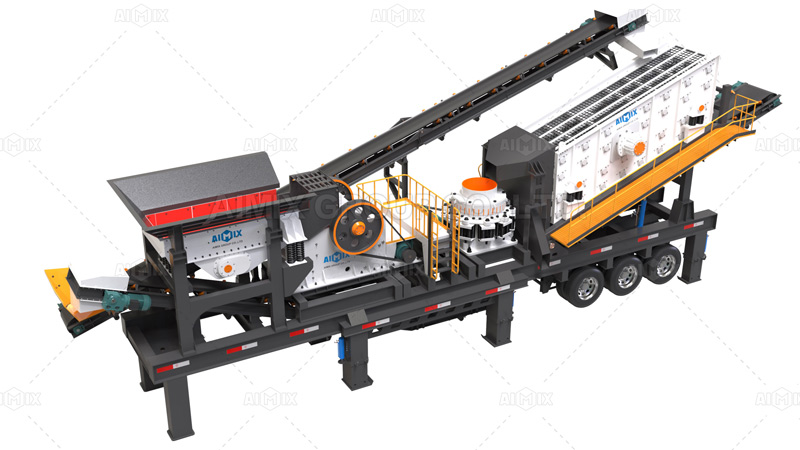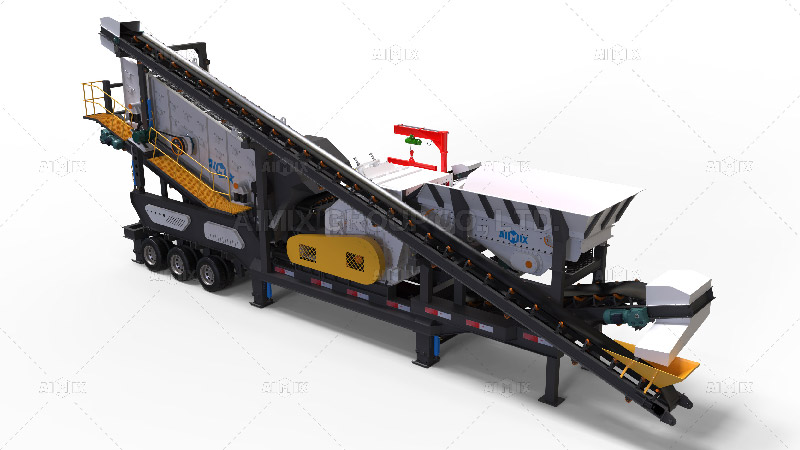How Do Mobile Crushers Improve Mobility and Efficiency?
The mining and aggregate industry has seen significant advancements in recent years, particularly with the introduction of mobile crushers. These versatile machines have transformed how stone crushing operations are conducted, offering numerous benefits in terms of mobility and efficiency. Mobile crushers, including mobile crusher plants, are a game-changer in aggregate production, enabling quicker setups, enhanced operational flexibility, and reduced transportation costs. In this article, we’ll explore how mobile crushers improve mobility and efficiency in the mining and aggregate industry.
Contents |
[edit] The Role of Mobile Crushers in the Aggregate Industry
In the past, traditional stationary crushers were the standard equipment used in aggregate plants. While these crushers performed their function effectively, they often required substantial infrastructure, long setup times, and high transportation costs for raw materials. As the demand for aggregates increased, especially in construction projects, the need for more flexible and efficient solutions became evident.
Enter mobile crushers, particularly stone crusher plants, which are designed to be moved easily from one location to another. These crushers offer the advantage of crushing materials on-site, directly at the source. This feature drastically reduces costs related to transporting raw materials, making mobile crushers an ideal solution for the modern aggregate industry.
[edit] Advantages of Mobile Crushers
[edit] Enhanced Mobility
One of the most significant advantages of mobile crushers is their enhanced mobility. Traditional stationary crushers are limited by their location and require extensive infrastructure to move materials. In contrast, mobile crushers are designed for easy transportation and can be relocated quickly between different work sites.
A mobile crusher plant can be set up directly at the quarry, eliminating the need to transport large volumes of raw materials over long distances. This is particularly beneficial for projects located in remote or difficult-to-access areas, where building permanent infrastructure would be costly and time-consuming. The flexibility to move equipment on-site as needed provides substantial operational advantages.
[edit] Streamlined Operations
In addition to mobility, mobile crushers help streamline operations by consolidating multiple processes into one compact unit. Traditional crushing operations often involve multiple machines working together in different locations, leading to increased complexity and additional costs. Mobile crushers, on the other hand, integrate various components, such as feeding, crushing, and screening, into a single machine. This simplifies the workflow and reduces the time spent on logistical tasks.
With stone crusher plants that combine multiple functions, operators can achieve higher production rates in less time. The ability to handle multiple stages of the crushing process within one plant minimises downtime and boosts overall productivity, ultimately contributing to more efficient operations.
[edit] Cost Reduction
Mobile crushers contribute significantly to cost reduction in several ways. First, they reduce transportation costs by processing materials on-site, eliminating the need for hauling raw materials to distant crushing plants. Second, mobile crushers are often more energy-efficient than stationary plants, as they are optimised for specific tasks and use advanced technologies to reduce fuel consumption and operational costs.
Furthermore, mobile crushers allow aggregate producers to optimise their operations by offering the flexibility to scale production based on demand. Whether handling small or large volumes of material, mobile crushers can be adjusted to meet specific project requirements, helping producers avoid unnecessary expenditure on equipment or labour.
[edit] How Mobile Crushers Improve Efficiency in Aggregate Production
[edit] Flexibility in Operations
One of the key reasons why mobile crushers are so effective in the mining and aggregate industry is their flexibility. Unlike traditional stationary crushers, mobile crushers can adapt to various production needs and types of materials. A mobile crusher plant can be configured with different types of crushers, such as jaw crushers, impact crushers, or cone crushers, depending on the material being processed.
This adaptability allows producers to optimise the crushing process for different types of stone and aggregate, improving the quality of the finished product. Whether dealing with hard or soft materials, mobile crushers can be adjusted to ensure the most efficient crushing process.
[edit] Reduced Environmental Impact
Another aspect of efficiency is environmental sustainability. Mobile crushers reduce the need for large-scale infrastructure development, such as access roads and quarrying activities, which can have a significant environmental impact. By processing materials on-site, mobile crushers limit the environmental footprint of operations.
Additionally, many mobile crushers are designed with eco-friendly features, such as dust suppression systems and fuel-efficient engines. These innovations help minimise emissions and reduce energy consumption, ensuring that the crushing process is as environmentally responsible as possible.
[edit] Faster Turnaround Times
Mobile crushers are designed for quick setup and operation, significantly improving turnaround times for construction projects. Because mobile crushers don’t require extensive site preparation or infrastructure, they can be set up and put into production within a short period. This is particularly beneficial for time-sensitive projects, where delays can be costly.
Moreover, mobile crushers are often equipped with automation features, such as remote control capabilities, that allow operators to monitor and adjust the crusher’s performance in real time. This allows for faster decision-making, reducing the time spent troubleshooting and ensuring continuous production.
[edit] Conclusion
Mobile crushers, especially mobile crusher plants, have revolutionised the aggregate production process by offering unmatched mobility, flexibility, and efficiency. These crushers provide significant cost savings, reduce transportation needs, and streamline crushing operations, making them an indispensable tool in the mining and aggregate industry.
As demand for construction aggregates continues to grow, mobile crushers will remain at the forefront of innovation, helping producers meet the challenges of modern construction projects while improving overall operational efficiency. With their ability to adapt to various project requirements and their environmental benefits, mobile crushers are the future of aggregate production.
Featured articles and news
A case study and a warning to would-be developers
Creating four dwellings... after half a century of doing this job, why, oh why, is it so difficult?
Reform of the fire engineering profession
Fire Engineers Advisory Panel: Authoritative Statement, reactions and next steps.
Restoration and renewal of the Palace of Westminster
A complex project of cultural significance from full decant to EMI, opportunities and a potential a way forward.
Apprenticeships and the responsibility we share
Perspectives from the CIOB President as National Apprentice Week comes to a close.
The first line of defence against rain, wind and snow.
Building Safety recap January, 2026
What we missed at the end of last year, and at the start of this...
National Apprenticeship Week 2026, 9-15 Feb
Shining a light on the positive impacts for businesses, their apprentices and the wider economy alike.
Applications and benefits of acoustic flooring
From commercial to retail.
From solid to sprung and ribbed to raised.
Strengthening industry collaboration in Hong Kong
Hong Kong Institute of Construction and The Chartered Institute of Building sign Memorandum of Understanding.
A detailed description from the experts at Cornish Lime.
IHBC planning for growth with corporate plan development
Grow with the Institute by volunteering and CP25 consultation.
Connecting ambition and action for designers and specifiers.
Electrical skills gap deepens as apprenticeship starts fall despite surging demand says ECA.
Built environment bodies deepen joint action on EDI
B.E.Inclusive initiative agree next phase of joint equity, diversity and inclusion (EDI) action plan.
Recognising culture as key to sustainable economic growth
Creative UK Provocation paper: Culture as Growth Infrastructure.























